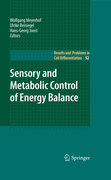
Sensory and metabolic control of energy balance
Meyerhof, Wolfgang
Beisiegel, Ulrike
Joost, Hans-Georg
The prevalence of obesity has dramatically increased in western and westernized societies, making the disease the second leading cause of unnecessary deaths in the US. Obesity results from imbalanced metabolic regulation leading to excessive lipid storage. As important novel entities in metabolic regulation, taste receptors and their cells are critical elements that adapt the gustatory system to metabolic signals and vice versa. The role of taste receptor genes in gastrointestinal tissues, as well as their dynamic regulation in gustatory and non-gustatory tissues in response to metabolic cues, has become the focus of an entirely new and rapidly developing research field with impacts on fuel sensing, metabolic control, and ingestive behavior. This book reflects the recent scientific progress in the field of fuel sensing in the mouth, GI tract, and brain and examines the olfactory bulb as a potential metabolic sensor and the brain-gut endocrine axis. It also touches on relevant novel molecular and cellular mechanisms regulating lipid storage and metabolism and covers the identification and functional characterization of obesity genes. Lastly, it illustrates the use of insect models to study relevant problems of energy homeostasis. Up-to-date account of the scientific progress made in the understanding of molecular mechanisms regulating energy metabolism Special emphasis on obesity Written by experts in the field INDICE: The Genetic Basis of Obesity and Type 2 Diabetes: Lessons from theNew Zealand Obese Mouse, a Polygenic Model of the Metabolic Syndrome Regulation of Nutrient Metabolism and Inflammation Lipid Storage in Large and Small Rat Adipocytes by Vesicle.- Associated Glycosylphosphatidylinositol.- Anchored Autophagy and Regulation of Lipid Metabolism Gene Co.- Expression Modules and Type 2 Diabetes Role of Zinc Finger Transcription Factor Zfp69 in Body Fat Storage and Diabetes Susceptibility of Mice Metabolic Sensing in Brain Dopamine Systems Oral and Extraoral Bitter Taste Receptors Reciprocal Modulation of SweetTaste by Leptin and Endocannabinoids Roles of Hormones in Taste Signaling Endocannabinoid Modulation in the Olfactory Epithelium The Olfactory Bulb: A Metabolic Sensor of Brain Insulin and Glucose Concentrations via a Voltage.- GatedPotassium Channel Energy Homeostasis Regulation in Drosophila: A Lipocentric Perspective Towards Understanding Regulation of Energy Homeostasis by CeramideSynthases Role of the Gut Peptide Glucose.- Induced Insulinomimetic Peptide in Energy Balance Adipocyte–Brain: Crosstalk.
- ISBN: 978-3-642-14425-7
- Editorial: Springer
- Encuadernacion: Cartoné
- Páginas: 205
- Fecha Publicación: 24/09/2010
- Nº Volúmenes: 1
- Idioma: Inglés
